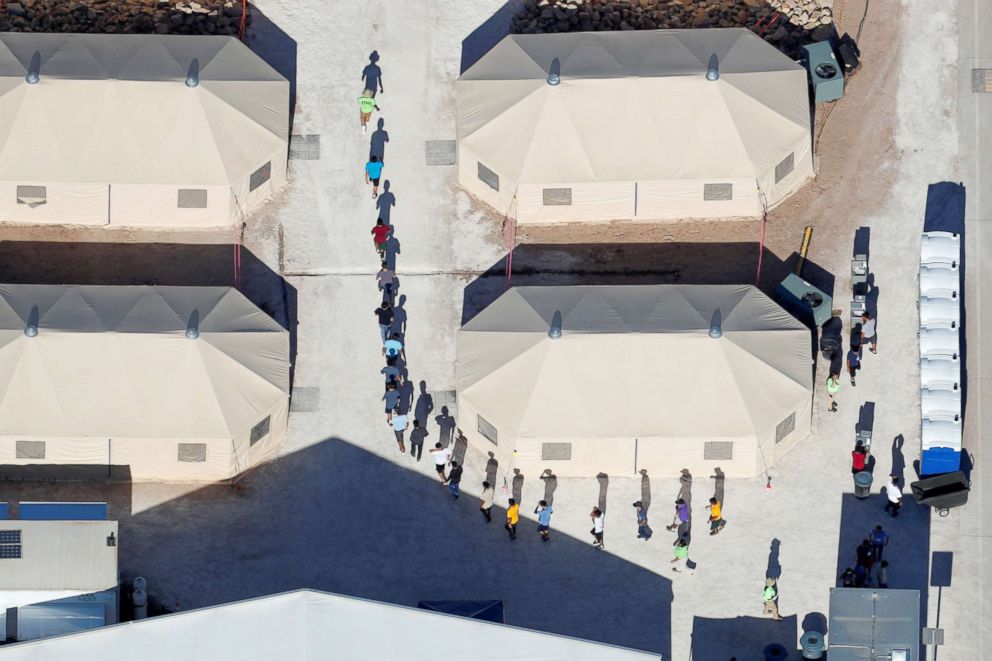Trump faces GOP rebellion on immigration as midterms loom: ANALYSIS
GOP lawmakers are concerned about the political fallout ahead of the midterms.
It was a signature issue of President Donald Trump’s election in 2016 – get-tough calls for a border wall, a crackdown on undocumented immigrants, even raising the prospect of mass deportations.
It’s now back in force in advance of the 2018 midterm elections. Only this time, add some jarring imagery that threatens quite the political twist.
The president is defending his policy of “zero tolerance” on the border by casting it as a necessary step against “murderers and thieves,” and blaming Democrats for creating a mess he’s trying to clean up.
But to millions of Americans, the faces and sounds of illegal immigration now are not of criminals but of young children, anguished by indefinite separation from their parents. And even Republicans aren’t buying the White House line that none of it is Trump’s fault.

To a swelling number of GOP lawmakers, the president’s renewed embrace of harsh immigration enforcement tactics and anti-immigrant rhetoric has them concerned about political fallout. Rather than talking about jobs and taxes, they find their party’s and the nation’s leader misleading the public about a policy that comes off as heartless and needless to many of their constituents.
“I don’t think this is going to age well over time,” Sen. Lindsey Graham, R-S.C., a onetime Trump antagonist who has grown friendly with the president, told reporters on Tuesday. “We'll see where the administration comes out.”
With the president headed to the Capitol to talk immigration with Republicans late Tuesday, he’s facing something of a rebellion from inside his own ranks.
Ohio Rep. Steve Stivers, charged with protecting the House GOP majority as chairman of the National Republican Congressional Committee, issued a statement blaming the Trump administration for “needlessly separating children from their parents.”
“The administration should end that new policy immediately,” said Sen. Lamar Alexander, R-Tenn.
“You can see these children, these innocent children, being ripped from their families,” said Rep. Mia Love, R-Utah. “It’s absolutely terrible.”
Republicans in battleground districts from Colorado to Florida have distanced themselves from the White House position, with some joining forces with Democrats to try to reverse the policies.
Even stalwart White House allies such as Sen. Orrin Hatch of Utah and Sen. Ted Cruz of Texas – himself up for reelection this year – are calling for the current policies to be reversed. Every living first lady wants the practice of separating children to end – a list that even includes Melania Trump.
Trump and his top administration officials, meanwhile, have offered unapologetic defenses of the policy that are also contradictory and, at times, outright misleading. Most broadly, and most falsely, Trump has blamed Democrats for what he calls a “horrible law” that is forcing his administration to take such actions.
No such law exists. Even Republican lawmakers concede that Trump could change the policy back to how President Barack Obama handled such cases almost instantaneously.
As for the policy’s intent, Homeland Security Secretary Kirstjen Nielsen on Monday said she found it “offensive” to suggest that the policy of separating kids from their parents would be meant to deter illegal immigration. But both White House chief of staff John Kelly and Attorney General Jeff Sessions have both cited deterrence as a main rationale for a crackdown of this nature.
The broader motivating factor for Trump and his political allies remains his promise to pursue stronger immigration policies than any president has proposed in decades.
With Congress grappling with several approaches to fund border security, legalize the so-called "Dreamers," and end separation of children from their families, former White House chief strategist Steve Bannon is warning of a backlash if policy moves in that direction.
“If you support this bill, I think this is the way the ‘deplorables’ don’t come out, I think this is a way potentially lose 50 seats” in the House, Bannon told Jonathan Karl on ABC’s “This Week” Sunday. “Otherwise, I think we run the tables.”
Bannon may have a sense of a chunk of the Trump base. Several recent polls have found a clear majority of Republicans supporting the separation policy in place now under the Trump administration.
But those polls have also found two-thirds of the broader public opposed to the policy. In a Quinnipiac University poll released Monday, 66 percent of respondents – and 68 percent of independents – say they do not favor separating children from their families at the border.
Trump has always felt comfortable playing to society’s divisions, buffeted by a political base that has grown angry and frustrated by immigration and its perceived impacts.
But even to a party that – to quote Republican Sen. Bob Corker – has generated a “cultish” devotion to its president, the worry here is Trump is talking about the wrong issues, and taking them too far.




